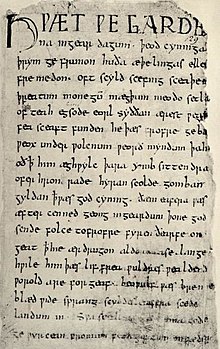Bēowulf
| Þis ȝeƿrit mæȝ clǣnung þurfan tō healdenne tōgædre mid þǣm cynde bisena Ƿicipǣdies. Bidde betera þis ȝeƿrit ȝif þū meahte. |
Beoƿulf ƿæs geanƿyrde beon þæt anne micelne leoþ inne Ænglisc aƿrit. Hit ƿæs ƿriten mid Ænglisc, mid Ƿestan-Saxon lædan, and æƿielmen mid spræc betƿeonan þæt neah 7 hundred geara AD and æror 9 hundred geara AD. Þone æƿielm notere ƿæs uncuþ, ac hit ƿæs æfterƿriten fram tƿegen notera, þa ƿæron gelician Cristne, and abidan sƿa anga anne boc geboren æt 10 hundred geara AD, habbe fram þæm Bryttiscan Muse. Þæt leoþ is 3182 lina lang, gebrocen into fruma and 43 læppan, and atellan Germanisc calendcƿide.

Beoƿulf, se ealdor, ƿæs Geatisc æþeling. Þa of þara pliht Hroþgar þone Deniscan cyning he gefracg, þa hƿa ferde to helpenne. Beoƿulf niþplegen and ofslagen þa niþig ƿuhte Grendel and Grendles modor, to ærgod lastƿord and lean. Hie þæræfter geanhƿurf cyþþu to ƿeorþenne Geatena cyning æftanƿeard, ƿyrd þa deaþ his fæderes. Hie regolian 50 ƿinter, and sƿealt ofslagen gram ƿyrm þæt abrocen his land. Hie ƿæs giermane fram his neodfreond Ƿiglaf.
Fruman
adihtan- Blair, Peter Hunter. An Introduction to Anglo-Saxon England, 3rd ed. Cambridge: Cambridge University Press, 2003.
- Chickering, Howell D. Beowulf - A Dual-language Edition. New York: Anchor Books, 2006.
- Mitchell, Bruce and Fred C. Robinson. A Guide to Old English, 6th ed. Oxford: Blackwell Publishing, 2001.
- “Dictionaries.” Old English Made Easy. June 16, 2006. October 25, 2006.
- “Old English Lexicon.” Archived 2009-06-04 at the Wayback Machine Northvegr.com. 2005. October 25, 2006
Ūtƿeardlice hlenċan
adihtan- Beoƿulf on Steorarume
- http://www.gutenberg.org/etext/9701
- http://www.uky.edu/~kiernan/eBeoƿulf/guide.htm
- http://www.engl.virginia.edu/OE/Beoƿulf.Readings/Beoƿulf.Readings.html Archived 2006-09-05 at the Wayback Machine